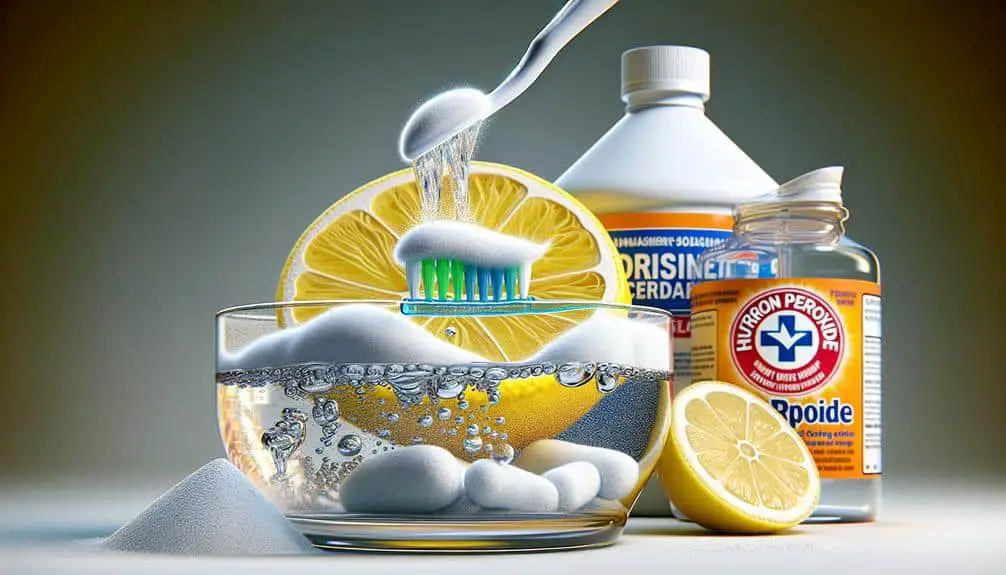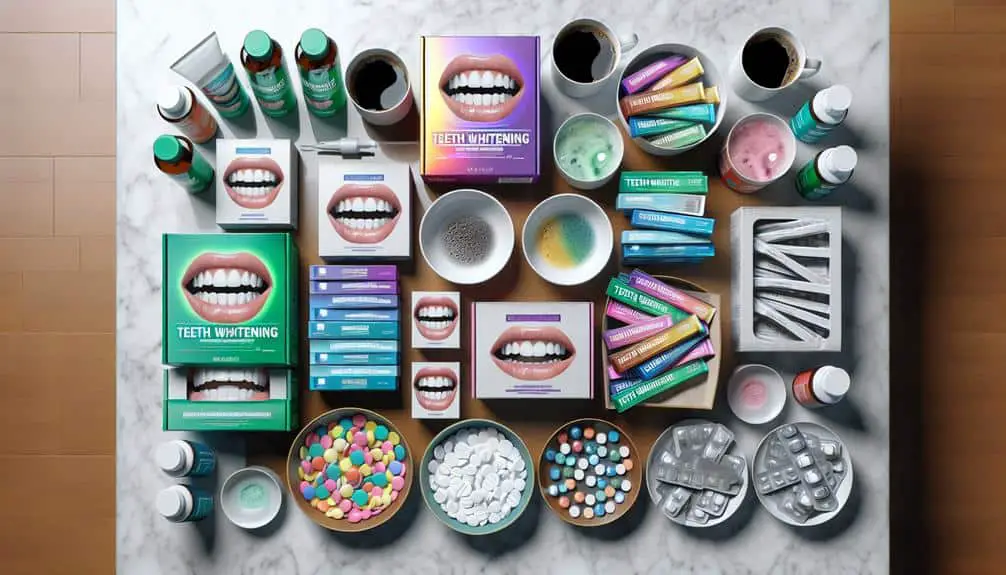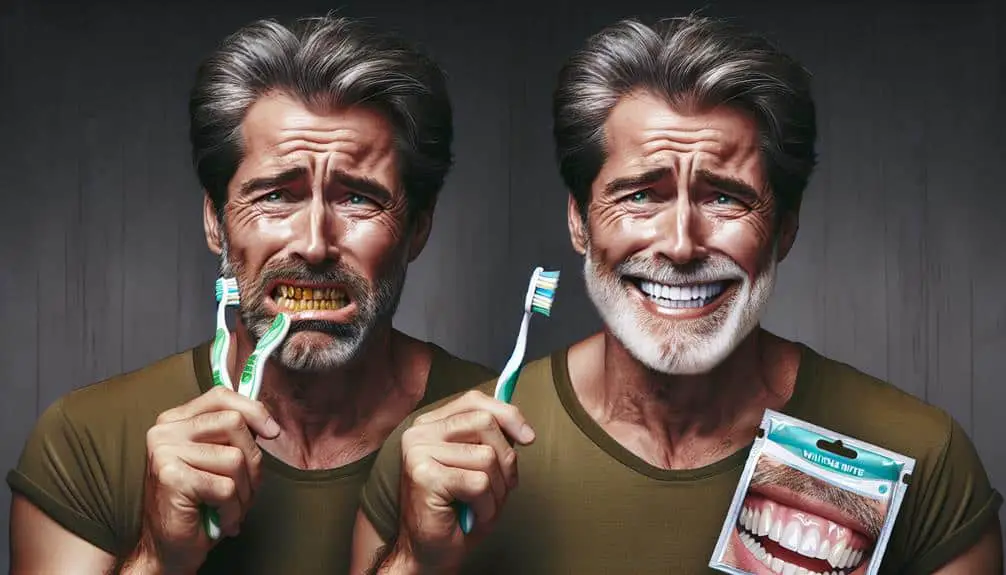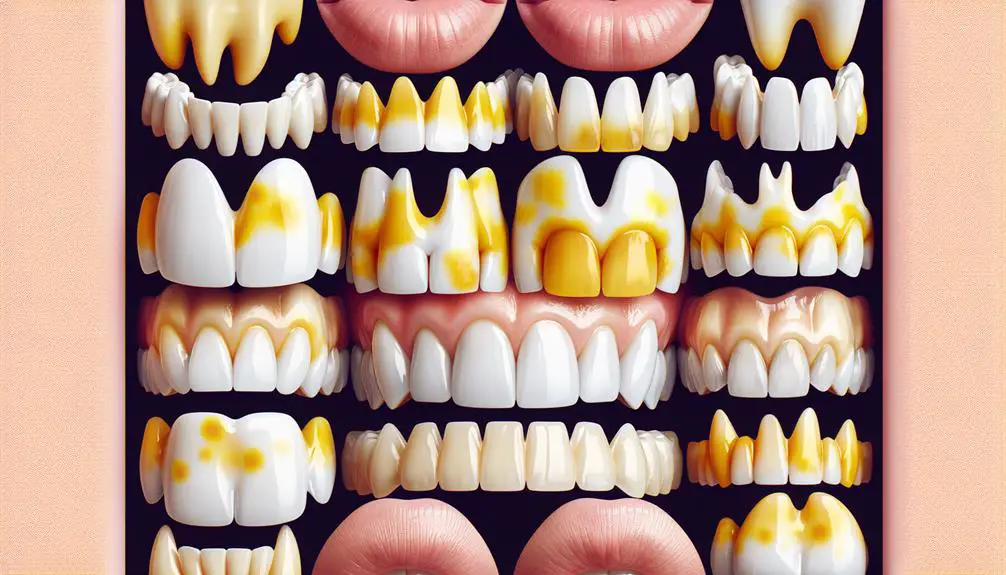To remove medication stains and whiten teeth: 1) Gently scrub with baking soda. 2) Rinse mouth after medication to reduce staining. 3) Consider professional whitening treatments for custom solutions. These tips will help you achieve a brighter and healthier smile.
Key Points
- Rinse mouth after taking medication to minimize staining.
- Use baking soda to gently scrub away medication stains.
- Consider professional whitening treatments for effective results.
- Maintain good oral hygiene with regular brushing and flossing.
- Choose whitening products with enamel protection for lasting effects.
Understanding Medication Stains
If you've noticed discoloration on your teeth and suspect it's due to medication, understanding medication stains is vital for effective treatment. Medication can have various effects on your oral health, including causing enamel damage that leads to stains. Stain prevention is essential in maintaining good oral hygiene and keeping your teeth looking their best.
To prevent medication stains, it's important to practice good oral hygiene habits such as brushing your teeth at least twice a day and flossing regularly. Additionally, scheduling regular dental cleanings can help remove any built-up stains and prevent further discoloration caused by medications.
Understanding how certain medications can affect your enamel is key to combating medication stains. Some medications can weaken the enamel, making it more susceptible to staining. If you're experiencing medication-induced stains, consulting with your dentist about possible treatment options, like professional whitening procedures, can help restore the natural whiteness of your teeth. Remember, maintaining a healthy oral care routine is essential in preventing and managing medication stains.
Choosing the Right Whitening Products
When picking whitening products for your teeth, contemplate selecting ones recommended by your dentist for safe and effective results. To guarantee you make the best choice, here are some factors to ponder:
- Gel vs. Strips: Gels are often more effective at reaching all areas of your teeth, while strips can be more convenient to use on the go.
- Charcoal vs. Toothpaste: Charcoal products can be abrasive and mightn't be suitable for daily use, while whitening toothpaste offers a milder option for regular use.
- Strength of Whitening Agents: Check the concentration of whitening agents in the product. Higher concentrations may provide faster results but can also lead to increased teeth sensitivity.
- Additional Dental Benefits: Some whitening products also offer additional benefits like enamel protection or gum health. Ponder if you want these added advantages when selecting your whitening product.
DIY Remedies for Stain Removal
To effectively remove stains from your teeth, consider trying out DIY remedies that can help brighten your smile. Natural alternatives and DIY hacks can be effective in removing medication stains and whitening teeth without the need for professional treatments.
One popular natural remedy is brushing with baking soda, which has mild abrasive properties that can help scrub away surface stains. You can mix a small amount of baking soda with water to form a paste and gently brush your teeth with it a few times a week.
Another DIY hack involves using hydrogen peroxide as a mouthwash. Hydrogen peroxide is a natural bleaching agent that can help lighten stains on your teeth. Simply mix a small amount of hydrogen peroxide with water, swish it around in your mouth for a minute or two, and then spit it out. Be cautious not to swallow the mixture and avoid excessive use, as it can cause gum irritation.
These DIY remedies provide cost-effective and natural ways to combat medication stains and enhance the whiteness of your teeth.
Professional Whitening Options
Consider professional whitening options as a reliable and efficient way to achieve a brighter smile and effectively remove stubborn stains from your teeth. Professional whitening treatments are performed by dental professionals who have the expertise to provide you with safe and effective solutions. Here are some popular professional whitening options to help you regain your bright smile:
- Laser Treatment: This method involves using a specialized light to enhance the whitening process, providing quick and noticeable results.
- Bleaching Trays: Custom-made trays are filled with a bleaching solution and placed over your teeth to whiten them evenly and effectively.
- In-Office Whitening: Dental clinics offer in-office whitening treatments that can noticeably lighten the shade of your teeth in just one session.
- Professional Whitening Gels: These gels contain higher concentrations of whitening agents compared to over-the-counter products, ensuring better results under the supervision of a dental professional.
Professional whitening options can be a great choice for those looking for quick and long-lasting results in their quest for a whiter smile.
Daily Oral Care Practices
Maintain a healthy smile by perfecting your brushing techniques to tackle stubborn stains effectively.
Remember, flossing is vital to reach areas between teeth where stains can accumulate.
Enhance your oral care routine with the benefits of using mouthwash to protect and strengthen your teeth.
Brushing Techniques for Stains
Implementing proper brushing techniques is essential for effectively removing stains and maintaining oral health. Here are some tips to help you combat medication stains and keep your teeth bright and healthy:
- Use the Right Toothbrush: Opt for a soft-bristled toothbrush to avoid damaging your enamel while effectively cleaning your teeth.
- Focus on Technique: Angle your brush at 45 degrees towards the gum line and use gentle, circular motions to remove stains and plaque thoroughly.
- Brush Twice a Day: Make sure to brush your teeth at least twice a day for two minutes each time to prevent stains from settling.
- Consider Electric Toothbrushes: Electric toothbrushes can provide a more thorough clean, helping to remove stubborn stains and improve overall dental care.
Importance of Flossing
Flossing daily is an essential component of maintaining excellent oral health and preventing dental issues. The benefits of flossing go beyond just removing food particles stuck between teeth.
By incorporating proper flossing techniques into your daily oral care routine, you can effectively prevent medication stains from settling in hard-to-reach areas. Flossing helps remove plaque and debris that brushing alone may not reach, reducing the risk of cavities and gum disease.
To maximize the benefits of flossing, gently glide the floss between each tooth in a C shape, ensuring you clean below the gumline. Make flossing a priority to enhance your overall oral hygiene and maintain a bright, healthy smile.
Mouthwash Benefits for Teeth
To enhance your daily oral care routine and further support the health of your teeth, consider incorporating mouthwash into your regimen for its beneficial effects on oral hygiene. Using mouthwash offers several advantages for your oral health and overall hygiene:
- Reduces Plaque: Mouthwash can help reduce plaque buildup, which is essential for preventing gum disease.
- Freshens Breath: Mouthwash provides minty freshness, keeping your breath feeling clean throughout the day.
- Prevents Cavities: Some mouthwashes contain fluoride, which aids in preventing cavities and strengthening tooth enamel.
- Fights Germs: Mouthwash can kill bacteria in your mouth, promoting a healthier oral environment and reducing the risk of infections.
Dietary Changes for Whiter Teeth
Consider incorporating teeth-strengthening foods into your daily diet to naturally enhance the whiteness of your teeth. Vital eating plays a significant role in maintaining not just overall health but also the brightness of your smile. Foods rich in nutrients like calcium and vitamin C can help strengthen and protect your teeth while also promoting a whiter appearance.
Including natural remedies like crunchy fruits and vegetables can act as natural teeth cleaners, helping to remove surface stains and plaque that can dull your smile.
To support whiter teeth, include foods like apples, carrots, celery, and strawberries in your diet. These fruits and vegetables contain high water content, which helps in stimulating saliva production, aiding in washing away food particles and bacteria. Additionally, dairy products like cheese and yogurt are rich in calcium and phosphates that help remineralize teeth and protect enamel.
Maintaining Your Bright Smile
Maintain a bright smile by incorporating daily oral hygiene practices and regular dental check-ups. Consistent care is crucial to keeping your teeth white and healthy. Here are some preventive measures and lifestyle choices you can make to guarantee your smile stays radiant:
- Brushing & Flossing: Brush your teeth at least twice a day and floss once daily to eliminate plaque and prevent staining.
- Healthy Diet: Limit sugary and acidic foods that can erode enamel, causing teeth to appear dull. Opt for teeth-friendly options like crunchy fruits and vegetables.
- Regular Dental Visits: Schedule bi-annual dental check-ups for professional cleanings and to address any potential issues early on.
- Avoid Tobacco & Staining Substances: Tobacco products and dark-colored beverages like coffee and red wine can stain teeth. Minimize their consumption to maintain a bright smile.
Frequently Asked Questions
Can Medication Stains Be Completely Removed With Whitening Products or DIY Remedies, or Are They Permanent?
Medication stains can be challenging to remove completely with whitening products or DIY remedies. Their permanence depends on the severity of the stains. Natural remedies may help, but prevention through lifestyle habits is key for effectiveness.
Are There Any Specific Types of Medications That Are More Likely to Cause Stubborn Stains on Teeth?
When it comes to medication types that may leave stubborn stains on your teeth, some are more likely culprits than others. By being aware and proactive with prevention tips, you can minimize potential staining and explore effective whitening options.
How Long Does It Typically Take to See Results From Professional Whitening Options for Medication Stains?
Typically, results from professional whitening options for medication stains can be seen within a few weeks. Following treatment, maintaining good oral hygiene and avoiding stain-causing substances are essential for long-lasting effects on your teeth.
Are There Any Special Precautions or Considerations to Keep in Mind When Using Whitening Products or Treatments for Medication Stains?
When using whitening products for medication stains, take precautionary measures. Follow expert recommendations to minimize side effects and maximize product effectiveness. Be mindful of the process and consult with professionals for tailored advice.
Can Dietary Changes Alone Help Prevent Medication Stains From Forming on Teeth in the Future?
To prevent medication stains on your teeth, dietary modifications alone may not be sufficient. Consider incorporating lifestyle changes like regular dental cleanings and using whitening products. Consult with your dentist for personalized solutions and effective prevention strategies.



